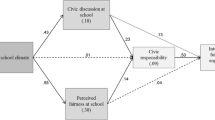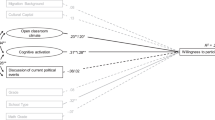Abstract
Teachers are thought to play an important role in fostering youth civic engagement; however, the current literature is limited with regard to providing concrete suggestions as to what teachers can do to promote youth civic engagement and why teachers have an impact on youth. To address these limitations, we simultaneously tested three alternative explanations to identify the critical way(s) in which perceived teachers’ behaviors might contribute to youth civic engagement in school. We also investigated the underlying processes that may explain why youth’s perceptions of teachers’ behaviors matter, by focusing on the mediating roles of young people’s feelings about politics and their political efficacy beliefs. The sample included 7th (n = 876, M age = 13.42, SD = .71; 51 % girls) and 10th grade students (n = 857, M age = 16.62, SD = .71; 51 % girls) residing in Sweden. Among the different aspects of perceived teacher behaviors, only an engaged and inspiring teaching style fostered youth’s initiations of civic and political discussions in class over time among both early and late adolescents. Moreover, youth’s feelings about politics significantly mediated the effect of perceived teachers’ behaviors on youth civic engagement in class. Contrary to our expectation, youth’s political efficacy did not act as a mediator. The present study sheds light on what teachers can do to promote youth civic and political engagement in a school setting.


Similar content being viewed by others

References
Abdelzadeh, A., Zetterberg, P., & Ekman, J. (2014). Procedural fairness and political trust among young people: Evidence from a panel study on Swedish high school students. Acta Politica,. doi:10.1057/ap.2014.22.
Act, Education. (2010). Skollagen (2010:800); med lagen om införande av skollagen (2010:801). Stockholm: Norstedts juridik.
Amnå, E., Ekström, M., Kerr, M., & Stattin, H. (2015). Codebook: The Political Socialization Program. Örebro: Örebro Univeristy.
Assor, A., Kaplan, H., Kanat-Maymon, Y., & Roth, G. (2005). Directly controlling teacher behaviors as predictors of poor motivation and engagement in girls and boys: The role of anger and anxiety. Learning and Instruction, 15, 397–413.
Assor, A., Kaplan, H., & Roth, G. (2002). Choice is good, but relevance is excellent: Autonomy-enhancing and suppressing teacher behaviours predicting students’ engagement in schoolwork. British Journal of Educational Psychology, 72, 261–278.
Bandura, A. (1997). Self-efficacy: The exercise of control. New York: Freeman and Company.
Barber, C., Torney-Purta, J., Wilkenfeld, B., & Ross, J. (2015). Immigrant and native-born adolescents’ civic knowledge and attitudes in Sweden and the United States: Emergent citizenship within developmental niches. Research in Comparative and International Education, 10, 23–47. doi:10.1177/1745499914567818.
Bayram Özdemir, S., & Stattin, H. (2014). Why and when is ethnic harassment a risk for immigrant adolescents’ school adjustment? Understanding the processes and conditions. Journal of Youth and Adolescence, 43, 1252–1265. doi:10.1007/s10964-013-0038-y.
Beaumont, E. (2010). Political agency and empowerment: Identifying four pathways for developing a sense of political efficacy in young adults. In J. Torney-Purta & C. Flanagan (Eds.), Handbook of research and policy on civic engagement in youth (pp. 525–558). New York: Wiley.
Beaumont, E., Colby, A., Ehrlich, T., & Torney-Purta, J. (2006). Promoting political competence and engagement in college students: An empirical study. Journal of Political Science Education, 2, 249–270. doi:10.1080/15512160600840467.
Campbell, D. E. (2008). Voice in the classroom: How an open classroom climate fosters political engagement among adolescents. Political Behavior, 30, 437–454. doi:10.1007/s11109-008-9063-z.
Campbell, A., Gurin, G., & Miller, W. E. (1954). The voter decides. Oxford: Row, Peterson, and Co.
Carnegie Corporation of New York and CIRCLE. (2003). The civic mission of schools. http://www.civicmissionofschools.org/campaign/documents/CivicMissionofSchools.pdf.
Davis, H. A. (2003). Conceptualizing the role and influence of student-teacher relationships on children’s social and cognitive development. Educational Psychologist, 38, 207–234. doi:10.1207/S15326985EP3804_2.
Ekman, J., & Amnå, E. (2012). Political participation and civic engagement: Towards a new typology. Human Affairs, 22, 283–300. doi:10.2478/s13374-012-0024-1.
Flanagan, C. A., Cumsille, P., Gill, S., & Gallay, L. S. (2007). School and community climates and civic commitments: Patterns for ethnic minority and majority students. Journal of Educational Psychology, 99, 421–431. doi:10.1037/0022-0663.99.2.421.
Flanagan, C., & Levine, P. (2010). Civic engagement and the transition to adulthood. The Future of Children, 20, 159–179.
Hahn, C. (1998). Becoming political: Comparative perspectives on citizenship education. Albany: Suny Press.
Holmberg, S., & Rothstein, B. (2015). Hög mellanmänsklig tillit i Sverige—Men inte bland alla. In A. Bergström, B. Johansson, H. Oscarsson, & M. Oskarson (Eds.), Fragment. Gothenburg: Göteborgs Universitet: SOM-Institutet.
Hu, L., & Bentler, P. M. (1999). Cutoff criteria for fit indexes in covariance structure analysis: Conventional criteria versus new alternatives. Structural Equation Modeling, 6, 1–55. doi:10.1080/10705519909540118.
Hughes, J. N., Cavell, T. A., & Willson, V. (2001). Further support for the developmental significance of the quality of the teacher–student relationship. Journal of School Psychology, 39, 289–301. doi:10.1016/S0022-4405(01)00074-7.
Isac, M. M., Maslowski, R., Creemers, B., & van der Werf, G. (2014). The contribution of schooling to secondary-school students’ citizenship outcomes across countries. School Effectiveness and School Improvement, 25, 29–63. doi:10.1080/09243453.2012.751035.
Jang, H., Reeve, J., & Deci, E. L. (2010). Engaging students in learning activities: It is not autonomy support or structure but autonomy support and structure. Journal of Educational Psychology, 102, 588–600. doi:10.1037/a0019682.
Kerr, M., & Stattin, H. (2000). What parents know, how they know it, and several forms of adolescent adjustment: Further evidence for a reinterpretation of monitoring. Developmental Psychology, 36, 366–380. doi:10.1037/0012-1649.36.3.366.
Lenzi, M., Vieno, A., Perkins, D. D., Santinello, M., Elgar, F. J., Morgan, A., & Mazzardis, S. (2012). Family affluence, school and neighborhood contexts and adolescents’ civic engagement: A cross-national study. American Journal of Community Psychology, 50, 197–210. doi:10.1007/s10464-012-9489-7.
Lenzi, M., Vieno, A., Sharkey, J., Mayworm, A., Scaahi, L., Pastore, M., & Santinello, M. (2014). How school can teach civic engagement besides civic education: The role of democratic school climate. American Journal of Community Psychology, 54, 251–261. doi:10.1007/s10464-014-9669-8.
Lindström, L. (2013). Citizenship education from a Swedish Perspective. Journal of Studies in Education, 3, 20–39.
Little, R. J., & Rubin, D. B. (2002). Statistical analysis with missing data (2nd ed.). New York, NY: Wiley.
Muthén, L. K. & Muthén, B. O. (1998–2010). Mplus user’s guide (6th ed.). Los Angeles, CA: Muthen & Muthen
Newmann, F. M. (1990). A test of higher-order thinking in social studies: Persuasive writing on constitutional issues using the NAEP approach. Social Education, 54, 369–373.
Niemi, R. G., & Junn, J. (2005). Civic education: What makes students learn. New Haven: Yale University Press.
Pasek, J., Feldman, L., Romer, D., & Jamieson, K. H. (2008). Schools as incubators of democratic participation: Building long-term political efficacy with civic education. Applied Development Science, 12, 26–37. doi:10.1080/10888690801910526.
Preacher, K. J., & Hayes, A. F. (2008). Asymptotic and resampling strategies for assessing and comparing indirect effects in multiple mediator models. Behavior Research Methods, 40, 879–891. doi:10.3758/BRM.40.3.879.
Quintelier, E. (2010). The effect of schools on political participation: A multilevel logistic analysis. Research Papers in Education, 25, 137–154.
Reddy, R., Rhodes, J. E., & Mulhall, P. (2003). The influence of teacher support on student adjustment in the middle school years: A latent growth curve study. Development and Psychopathology, 15, 119–138. doi:10.1017/S0954579403000075.
Reeve, J. (2006). Teachers as facilitators: What autonomy-supportive teachers do and why their students benefit. The Elementary School Journal, 106, 225–236. doi:10.1086/501484.
Roeser, R. W., & Eccles, J. S. (1998). Adolescents’ perceptions of middle school: Relation to longitudinal changes in academic and psychological adjustment. Journal of Research on Adolescence, 8, 123–158. doi:10.1207/s15327795jra0801_6.
Schafer, J. L., & Graham, J. W. (2002). Missing data: Our view of the state of the art. Psychological Methods, 7, 147–177. doi:10.1037/1082-989X.7.2.147.
Schulz, W., Ainley, J., Fraillon, J., Kerr, D., & Losito, B. (2010). ICCS 2009 international report: Civic knowledge, attitudes, and engagement among lower-secondary school students in 38 countries. International Association for the Evaluation of Educational Achievement. Herengracht 487, Amsterdam, 1017 BT, The Netherlands.
Skinner, E. A., Zimmer-Gembeck, M. J., & Connell, J. P. (1998). Individual differences and the development of perceived control. Monographs of the Society for Research in Child Development, 63 (2–3, Serial No. 254).
Sohl, S., & Arensmeier, C. (2015). The school’s role in youths’ political efficacy: Can school provide a compensatory boost to students’ political efficacy? Research Papers in Education, 30, 133–163. doi:10.1080/02671522.2014.908408.
Suarez-Oronzco, C., Pimentel, A., & Martin, M. (2009). The significance of relationships: Academic engagement and achievement among newcomer immigrant youth. Teachers College Record, 111, 712–749.
Svenson, Y., Stattin, H., & Kerr, M. (2011). In- and out-of-school peer groups of immigrant youths. European Journal of Developmental Psychology, 8, 490–507.
Tabachnick, B. G., & Fidell, L. S. (2007). Using multivariate statistic (5th ed.). Boston, MA: Allyn & Bacon.
Torney-Purta, J. (2002). The school’s role in developing civic engagement: A study of adolescents in twenty-eight countries. Applied Developmental Science, 6, 203–212. doi:10.1207/S1532480XADS0604_7.
Torney-Purta, J., Barber, C. H., & Wilkenfeld, B. (2007). Latino adolescents’ civic development in the United States: Research results from the IEA Civic Education Study. Journal of Youth and Adolescence, 36, 111–125. doi:10.1007/s10964-006-9121-y.
Vieno, A., Perkins, D. D., Smith, T. M., & Santinello, M. (2005). Democratic school climate and sense of community in school: A multilevel analysis. American Journal of Community Psychology, 36, 327–341. doi:10.1007/s10464-005-8629-8.
Wentzel, K. R. (1997). Student motivation in middle school: The role of perceived pedagogical caring. Journal of Educational Psychology, 89, 411–419. doi:10.1037/0022-0663.89.3.411.
Zeldin, S., & Topitzes, D. (2002). Neighborhood experiences, community connection, and positive beliefs about adolescents among urban adults and youth. Journal of Community Psychology, 30, 647–669. doi:10.1002/jcop.1002.
Acknowledgments
This study was made possible by access to data from the Political Socialization Program, a longitudinal research program at YeS (Youth and Society) at Örebro University, Sweden. Responsible for the planning, implementation, and financing of the collection of data were professors Erik Amna, Mats Ekström, Margaret Kerr and Håkan Stattin.
Authors’ Contributions
SBÖ developed the research idea for this study, performed the analysis, and drafted the manuscript. HS designed the original longitudinal study, collaborated with SBÖ in structuring the conceptual bases of the study, and worked on the interpretation of the findings. MÖ collaborated with SBÖ in performing the analyses and drafting the manuscript. All authors read and approved the final manuscript.
Funding
This study was funded by a grant received from Riksbankens Jubileumsfond.
Author information
Authors and Affiliations
Corresponding author
Ethics declarations
Conflict of interest
The authors report no conflict of interests.
Ethical Approval
The Regional Research Ethics Committee approved the study and its procedures.
Informed Consent
All participants were informed about and consented to take part in the study.
Rights and permissions
About this article
Cite this article
Bayram Özdemir, S., Stattin, H. & Özdemir, M. Youth’s Initiations of Civic and Political Discussions in Class: Do Youth’s Perceptions of Teachers’ Behaviors Matter and Why?. J Youth Adolescence 45, 2233–2245 (2016). https://doi.org/10.1007/s10964-016-0525-z
Received:
Accepted:
Published:
Issue Date:
DOI: https://doi.org/10.1007/s10964-016-0525-z



